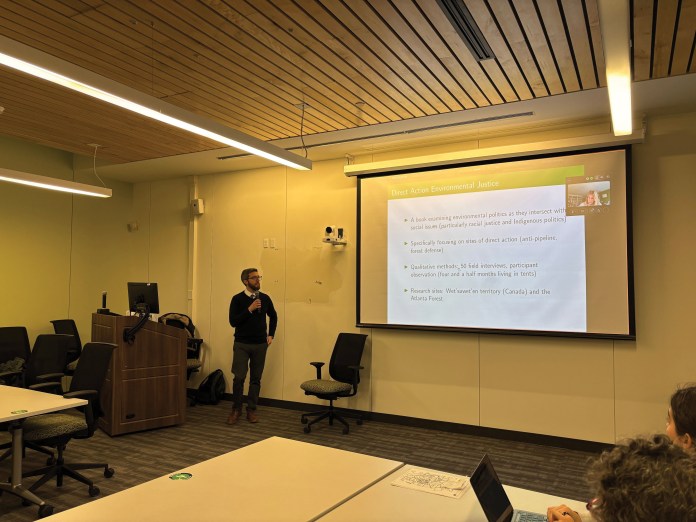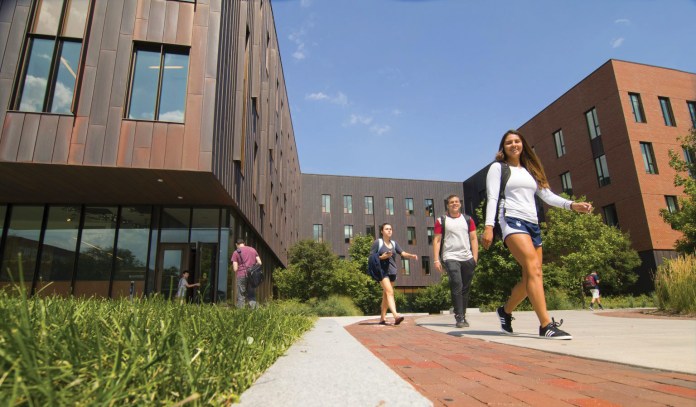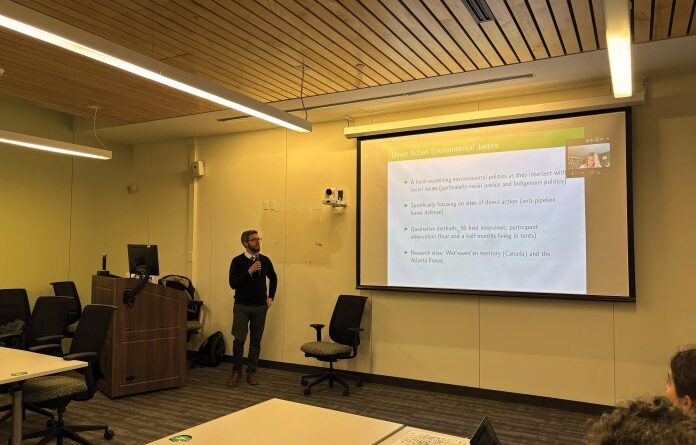Environmental stewardship is not the same as environmental justice
The University of Connecticut’s political science department hosted guest speaker Joseph Brown for a presentation on his upcoming book, “For the People and the Land: Direct Action Environmental Justice” on Thursday, Nov. 21.
Brown is an assistant professor of political science at the University of Massachusetts Boston. His book examines “environmental politics as they collide with social issues,” he said. In particular, he focuses on racial justice and Indian politics. The specific actions he examines are related to anti-pipeline and forest protection movements.
For his research, Brown conducted about 50 interviews and visited two research sites: the Wet’suwet’en region in Canada and the Atlanta Forest in Georgia. Although he began his research with the environment in mind, he quickly discovered that the actors in these organizations did not describe themselves as environmentalists.

He said: “I wanted to talk to people about why they choose to take direct action, how they choose certain tactics, what they expect to get when faced with pipeline companies directly.” After spending time with the people of these places, Brown quickly understood that he had to talk about his subject in a different way and from a different perspective.
“The last place where the first research plan came up was when I got to the Wet’suwet’en area and started talking to the land protectors,” he said. They told me they are not environmentalists. That’s why I’ve talked about these things as environmental justice, which I think is a feature that has a basis in the literature on Indian national security and opposition to pipelines and other infrastructure projects. ”
His time in the Wet’suwet’en region allowed him to examine the ways in which the hereditary chiefs of the Wet’suwet’en Nation have opposed Canada’s Coastal GasLink pipeline since 2010.
Their main tactics have been blockades of key access points and camps, or court battles.
He said: “There have been various tactics that they have tried to use in order to try to prevent this pipeline from going through their territory without their permission. “High level stuff. have been obstacles or encroachments on the pipeline from being built. But again, things like court battles, challenging permits, challenging the companies involved, challenging the Canadian government and its absolute right to operate in that area, which is not really you cannot be divided and there is no consensus.”
The second issue is the Stop Cop City campaign in Atlanta. There is a community organization that is trying to stop the construction of a $90 million police training center in Greater Atlanta. The city already has a strong relationship with law enforcement, and the agency says the facility will demolish a 380-acre forested area in the Atlanta Forest.
Their tactics vary but include the occupation of forests with tree houses, riots, burning and begging, according to Brown.
He said: “The Atlanta Police Department wanted to build and still wants to build this building, which is mockingly called “Cop City” by the opponents of “It will involve an urban environment to practice riot control tactics, which is very unusual after the 2020 racial justice riots, it doesn’t have much support in the community around the forest.”

The consensus he found in both studies is that they consider vandalism to be non-violent behavior. No organization condones violence or harming the people involved.
Brown shared the sad news that a protester he interviewed for the Stop Cop City Campaign was killed by police, and 61 are facing RICO/terrorism charges. Due to the tense situation in Atlanta, Brown was unable to use participant awareness as he did with the Wet’suwet’en Nation for fear of arrest and prosecution by the police.
Another aspect that both areas share is that they disagree on the environment, and see their problems as widespread. Brown talked about Chief Geltiy during his time in the Wet’suwet’en area and provided quotes from him.
“What does it mean to be an environmentalist? Because I think we live off the land just like our ancestors lived,” he said.
Atlanta’s problems are not from the point of view of environmentalists, but from racial injustice and police brutality. Stop Cop City’s interviewee, Isshin, talked about the disparity between the white people in the neighborhood and their group.
“This is a little joke I’m making,” he said. It’s almost like white people come in and with environmental work, they make this forest beautiful.
Returning to the project of Brown’s book, he wanted to examine why these groups choose direct action, rather than indirect action. The answers his interviews provided can be divided into three categories: instrumental logic, contingency and world building.
The first reasons he encountered were that people were tired of not being heard and were determined to increase. The second refers to the idea that these issues are an emergency situation, and they are mostly found in young people. The final goal is that indirect actions appeal to the authorities and thus reinforce their position and power.
While these reasons may seem counterintuitive, Brown says these groups work together in many situations because they need each other’s skills and resources.
#Environmental #stewardship #environmental #justice
